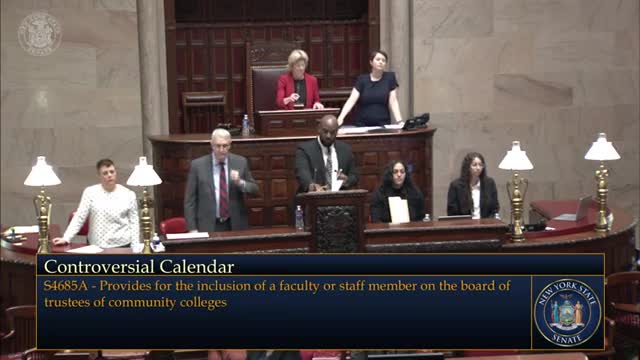Senate approves nonvoting faculty representative on SUNY community college boards amid conflict-of-interest debate
Get AI-powered insights, summaries, and transcripts
Subscribe
Summary
Lawmakers approved legislation (Senate print 4685a) to add a nonvoting faculty or staff representative to SUNY community college boards of trustees. Sponsors said the position will be nonvoting and selected by the institution's faculty and staff; opponents raised concerns about conflicts of interest and access to executive sessions.
The New York State Senate on April 24, 2025, passed legislation (Senate print 4685a / Calendar No. 457) that adds a nonvoting faculty or staff representative to the boards of trustees at SUNY community colleges.
Sponsor Senator Stavisky said the representative would be a nonvoting member chosen by the institution's faculty and staff and characterized the change as part of a broader effort at inclusiveness. "The faculty member chosen by the faculty and the staff, would be a non voting member," Stavisky said on the floor.
Opponents, including Senator Burrell, argued that adding a paid faculty member to a board that discusses compensation, discipline and other confidential matters creates a conflict of interest. Burrell said campuses face "financial strains" and that placing a paid employee into trustee discussions — including executive sessions — could impair trustees' ability to make difficult decisions about campus finances and staffing.
Repeated floor questions focused on whether the bill contains explicit recusal language or specific penalties tied to confidentiality breaches. Stavisky and staff referenced existing statutes, saying penalties and rules under the Public Officers Law and General Municipal Law would apply. She also said the bill's amendment references those laws and that selection would be by vote of the local faculty and staff "in the same manner that the student is selected."
The bill was temporarily restored to the noncontroversial calendar by consent and then passed. The clerk announced the final vote tally; the transcript lists 41 senators recorded in the affirmative and 10 in the negative. Senators recorded voting in the negative included Barela, Chan, Fahey, Bridal, Lanza, Oborakka, O'Mara, Ord, Rhodes and White.
Why it matters: The legislation changes board composition at SUNY community colleges by formalizing a faculty/staff voice in governance deliberations. Supporters described the change as a step toward inclusiveness; opponents warned it could introduce conflicts where the faculty/staff representative would be subject to matters under board consideration.
Next steps and clarifications: The sponsor said the representative would be nonvoting, that selection would be by the college's faculty and staff (by vote), and that existing confidentiality statutes would apply. Opponents maintained that the statutory protections and penalties may not fully address the structural conflict created by adding a paid employee to executive discussions affecting compensation and discipline.
